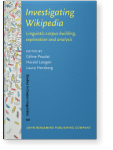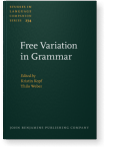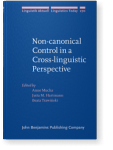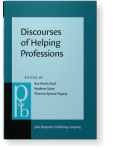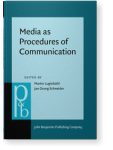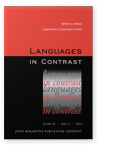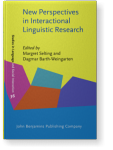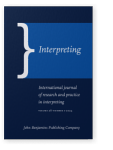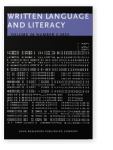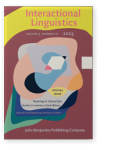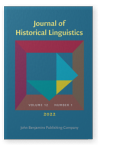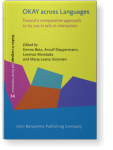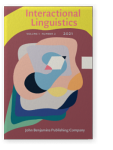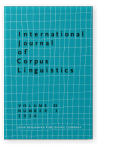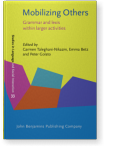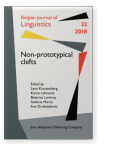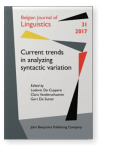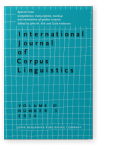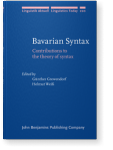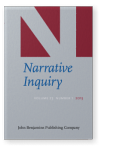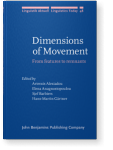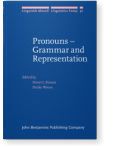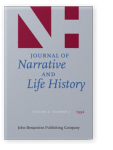Leibniz Institute for the German Language
List of John Benjamins publications for which someone affiliated with Leibniz Institute for the German Language plays a role.
Free Variation in Grammar: Empirical and theoretical approaches to optionality in grammar
Edited by Kristin Kopf & Thilo Weber
[Studies in Language Companion Series, 234] 2023. | edited volumeSubjects Historical linguistics | Sociolinguistics and Dialectology | Syntax | Theoretical linguistics
Non-canonical control in a cross-linguistic perspective
Edited by Anne Mucha, Jutta M. Hartmann & Beata Trawiński
[Linguistik Aktuell/Linguistics Today, 270] 2021. | edited volumeSubjects Generative linguistics | Syntax | Theoretical linguistics
Discourses of Helping Professions
Edited by Eva-Maria Graf, Marlene Sator & Thomas Spranz-Fogasy
[Pragmatics & Beyond New Series, 252] 2014. vi, 320 pp. | edited volumeSubjects Discourse studies | Pragmatics
2024 Handling signs medially: On mediality and indexicality in semiotic media
practices
Keywords semiotic media practices | indexicality | praxeology | media linguistics | prisoners of war | Second World War | eavesdropping | mediality | semioticity | sociality
2024 Introducing the “Parallel European Corpus of Informal Interaction” (PECII): A novel resource for exploring cross-situational and cross-linguistic variability in social interaction
In: New Perspectives in Interactional Linguistic Research[Studies in Language and Social Interaction, 36] pp. 132–160
Keywords Interactional Linguistics | corpus | informal interaction | European languages | cross-linguistic | comparison | activity | situation design | intervention | turn-initial elements
2024 What do you understand by X?: Semantics in Interactional Linguistics
In: New Perspectives in Interactional Linguistic Research[Studies in Language and Social Interaction, 36] pp. 103–131
Keywords Interactional Linguistics | Interactional Semantics | definition | interactional history | meta-semantic practice | semantics | person-reference
2024 What to do next:
Should I and ((Do) you) want me to
in joint activities in American English
In: New Perspectives in Interactional Linguistic Research[Studies in Language and Social Interaction, 36] pp. 20–48
Keywords social action format | action formation | conversation analysis | interactional linguistics | offers | project | self | other | responsibility | grammar
2024 Investigating reply relations on Wikipedia talk pages to reconstruct interactional strategies of Wikipedia authors
In: Investigating Wikipedia: Linguistic corpus building, exploration and analysis[Studies in Corpus Linguistics, 121] pp. 107–133
Keywords Wikipedia talk pages | reply relations | referencing strategies | interactional structures | computer-mediated communication | CMC
2023 Coordination in telephone-based remote interpreting
Keywords telephone interpreting | turn-taking | trouble sources | Arabic | German | dialogue interpreting
2023 Handwritten letters and grammatical structures in German: A framework
Keywords graphetics | graphematics | letterforms | handwriting | basic shapes
2024 Meaning in interaction
Keywords Interactional Linguistics | Interactional Semantics | meaning | semantics
2024 Ad-hoc-compounds in spoken German: (When) do we need compositionality?
Keywords morphology | word formation | ad-hoc-expressions | repair | Conversation Analysis (CA) | Interactional Linguistics (IL)
2024 Meta-semantic practices in social interaction: Definitions and specifications provided in response to Was heißt X (‘what does X mean’)
Keywords Interactional Linguistics | semantics | definition | specification | repair-initiation
2022 Relationship management by means of solution-oriented questions in German psychodiagnostic interviews
In: Relationships in Organized Helping: Analyzing interaction in psychotherapy, medical encounters, coaching and in social media[Pragmatics & Beyond New Series, 331] pp. 127–150
Keywords relationship | therapeutic alliance | solution-oriented questions | psychodiagnostic interview | psychotherapy
2022 Reichenbach meets underspecification: A novel approach to the perfect-past-cycle in German (and elsewhere)
Keywords tense | preterite | perfect | underspecification | German | semantics | pragmatics
2021 Coordination of OKAY, nods, and gaze in claiming understanding
and closing topics
In: OKAY across Languages: Toward a comparative approach to its use in talk-in-interaction[Studies in Language and Social Interaction, 34] pp. 363–393
Keywords nodding | gaze | multimodal | bodily conduct | object manipulation | understanding | closing | transition | change-of-state token | German
2021 OKAY in responding and claiming understanding
In: OKAY across Languages: Toward a comparative approach to its use in talk-in-interaction[Studies in Language and Social Interaction, 34] pp. 56–92
Keywords informing | second position | third position | closing | understanding | intersubjectivity | newsmark | continuer | (discrepancy of) expectation | prosody
2021 Positionally-sensitive action-ascription: Uses of Kannst du X? ‘Can you X?’ in their sequential and multimodal context
Keywords action-ascription | request | question | Interactional Linguistics | Conversation Analysis | modal verbs | positionally-sensitive grammar | German
2021 Data and methods used in the study of OKAY across languages
In: OKAY across Languages: Toward a comparative approach to its use in talk-in-interaction[Studies in Language and Social Interaction, 34] pp. 30–51
Keywords comparison | data | transcription | recording | multimodality | sequentiality | context
2020 Tracking and analyzing recent developments in German-language online press in the face of the coronavirus crisis:
cOWIDplus Analysis and cOWIDplus Viewer
Keywords RSS newsfeed corpus | data visualization | linguistic diversity | vocabulary | coronavirus
2020 Doing more than expected: Thanking recognizes another’s agency in providing
assistance
In: Mobilizing others: Grammar and lexis within larger activities[Studies in Language and Social Interaction, 33] pp. 253–278
Keywords agency | cooperation | courses of action | cultural diversity | expectation | gratitude | offers | recruitment | requests | thanking
2019 Restrictions on “Low” person agreement in Dutch specificational
copular constructions
Keywords Dutch | person agreement | copular constructions | syntax
2019 A focus analysis of apparent predicational clefts
Keywords
it-clefts | English | focus | contrast | focus alternatives | specificational copular clauses
2016 Good practices in the compilation of FOLK, the Research and Teaching Corpus of Spoken German
Keywords oral corpora | corpus interface | transcription | spoken language
